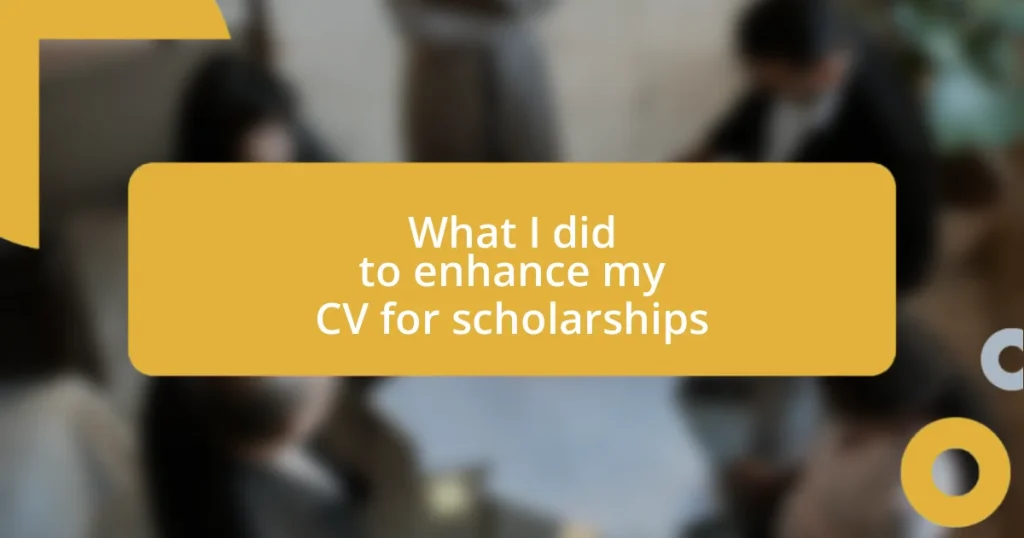Key takeaways:
- Understanding scholarship requirements involves aligning your experiences and achievements with specific eligibility criteria and showcasing personal narratives to stand out.
- Identifying key components of your CV, such as academic qualifications, extracurricular activities, and volunteer work, is essential for crafting a compelling scholarship application.
- Seeking feedback from mentors and peers can provide valuable insights, helping to refine your CV and enhance personal storytelling for a stronger impression.
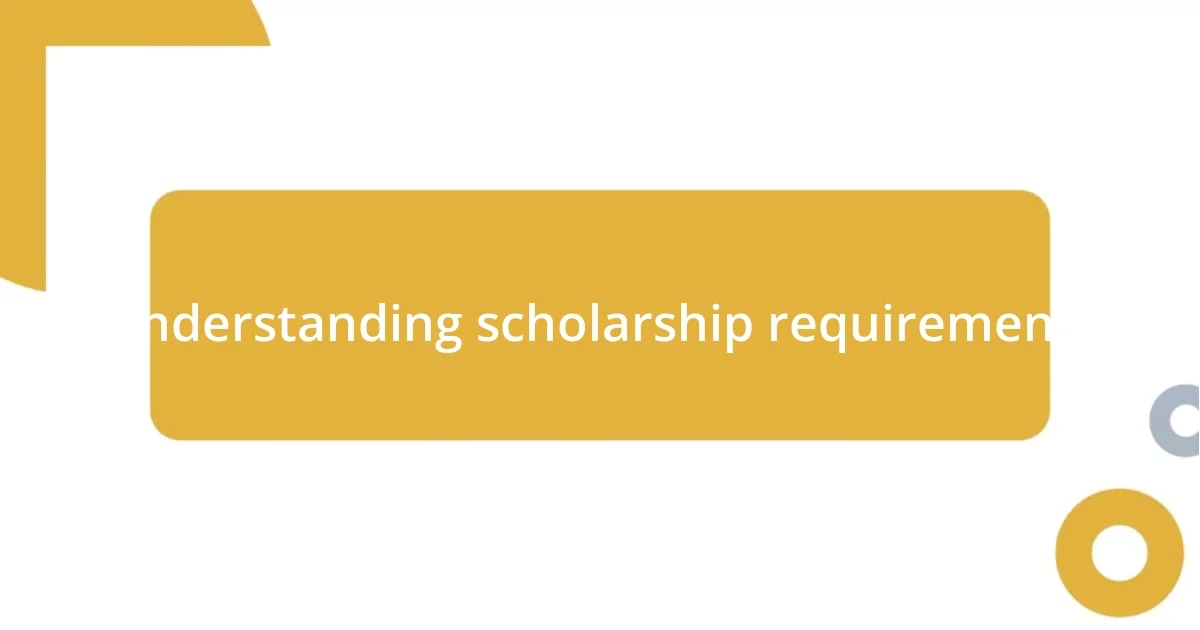
Understanding scholarship requirements
Understanding scholarship requirements is crucial for anyone looking to secure funding for their education. I remember feeling overwhelmed when I first glanced at a long list of criteria for a scholarship I was interested in. Did I meet all the requirements? It made me realize the importance of breaking down each component into smaller, manageable pieces.
As I delved deeper, I discovered that many scholarships have specific academic thresholds, extracurricular commitments, or demographic criteria. For instance, one scholarship I applied for required community service hours. At first, I thought my volunteer work was sufficient, but reflecting on it, I realized I needed to actively engage in more diverse activities to stand out. Have you thought about how your unique experiences align with different scholarship requirements? This alignment can truly make a difference in your application.
Moreover, I found it invaluable to reach out to past scholarship recipients or mentors for insights. They often provided perspectives I hadn’t considered, like emphasizing personal statements or tailoring essays to reflect the scholarship’s mission. It was this personal touch that helped me secure funding later on. Have you tapped into your network for advice? Understanding these nuances can significantly enhance your approach and boost your chances of success.
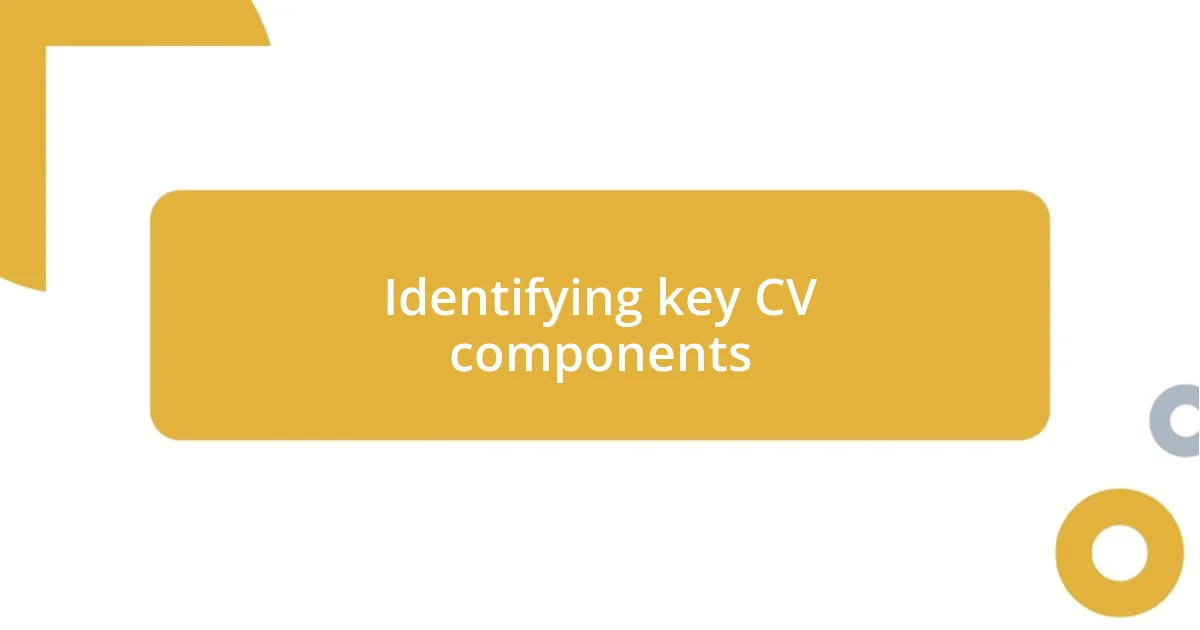
Identifying key CV components
Identifying the key components of your CV is essential in crafting a compelling narrative for scholarship applications. I remember sorting through my experiences and realizing that not all achievements carry the same weight. It’s about being intentional with what you choose to highlight. Take the time to consider each element of your CV, whether it’s your academic performance, relevant skills, or extracurricular activities. Reflect on how they connect with the scholarship’s values and goals; this will help you curate a targeted application that truly shines.
Here’s a list of the key components you should include in your CV:
– Academic Qualifications: Include your GPA, relevant coursework, and honors.
– Extracurricular Activities: Highlight leadership roles or unique contributions that showcase your personality.
– Work Experience: Detail internships or jobs that enhance your profile, emphasizing skills gained or responsibilities held.
– Volunteer Work: Mention community service or engagement that reflects your commitment to social causes.
– Awards and Recognitions: Show any scholarships, grants, or accolades that can bolster your credibility.
– Skills: Include any specific abilities or competencies relevant to the scholarship.
During my own journey, I found that approaching my CV as a storytelling exercise made a significant difference. By weaving together my experiences to reflect a coherent narrative, I was able to convey not just my qualifications but also my passion and purpose.
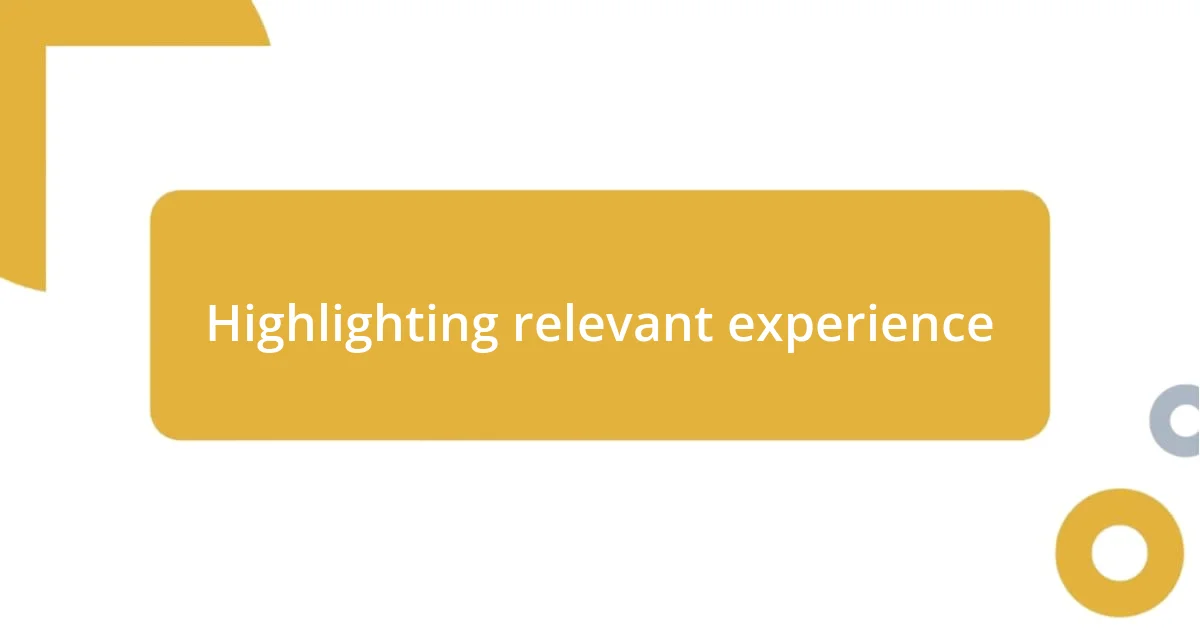
Highlighting relevant experience
Highlighting relevant experience is a key aspect of crafting a standout CV for scholarship applications. When I organized my experiences, I focused on those that truly aligned with the scholarship’s objectives. For example, I didn’t just list my volunteer hours at the local charity; I shared a story about helping organize a community event that brought diverse groups together. This not only showcased my commitment to service but also revealed my ability to lead and connect with others—qualities that many scholarship committees value.
I learned that it’s not enough to just mention relevant experiences; they need to resonate. During one scholarship application, I highlighted my internship at a nonprofit organization. I didn’t simply state my responsibilities; I illustrated how I contributed to a project that increased community awareness about environmental issues. This anecdote allowed me to demonstrate my proactive approach and passion for sustainability. Are you considering how your experiences can tell a story? Diving into details can make your CV memorable.
As I re-evaluated my CV before submitting applications, I noticed that numbers often speak volumes. For instance, instead of saying “participated in community service,” I quantified my impact by stating “organized three community clean-up events, resulting in 200+ volunteer hours.” This change not only added credibility but painted a clearer picture of what I had accomplished. It’s essential to remember that relevant experience should not only reflect what you’ve done but also emphasize the impact you made. How are you framing your experiences to reflect your contributions?
| Relevant Experience | How to Highlight |
|---|---|
| Volunteer Work | Share a specific project or impact made. |
| Internship | Detail specific contributions and outcomes. |
| Leadership Roles | Emphasize skills acquired and teamwork. |
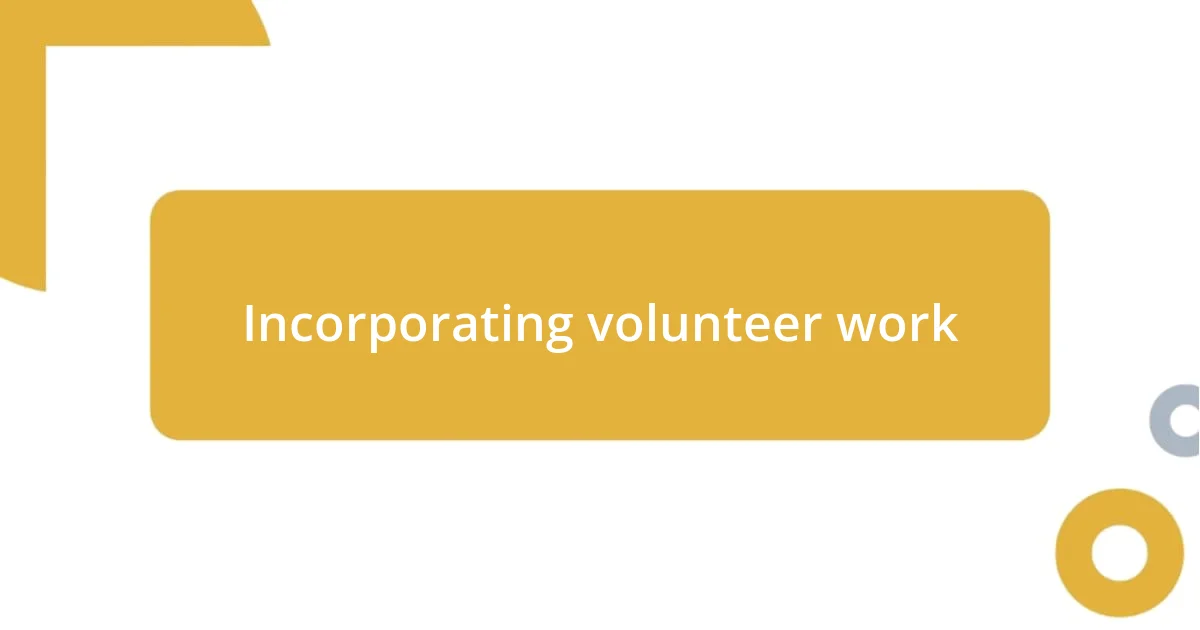
Incorporating volunteer work
When I started incorporating volunteer work into my CV, I quickly realized it wasn’t just about listing hours served; it was about the stories behind those experiences. Volunteering at a local animal shelter, for example, taught me invaluable organizational skills. I didn’t merely show up to help; I organized adoption events and managed the social media campaign. This revealed my ability to take initiative and lead projects, qualities that strongly appealed to scholarship committees.
I remember feeling a mix of pride and purpose as I reflected on my work with a youth mentorship program. It wasn’t just a footnote on my CV—it ignited a passion for empowering others. Sharing how I developed workshops and built relationships with mentees allowed me to convey my dedication to community development, aligning perfectly with the values of the scholarships I sought. It’s intriguing, isn’t it? How can one experience shape your narrative and connect with the goals of an organization?
In my quest to enhance my CV, I also focused on the impact of my volunteer work. For instance, I didn’t settle for simply stating that I volunteered at a food bank. Instead, I articulated how I led a team that implemented a new food distribution strategy, resulting in a 30% increase in efficiency. This detail transformed a mundane listing into an impactful accomplishment. Isn’t it powerful to think how this kind of information can instantly elevate your application? Each volunteer role can tell a unique story, showcasing your skills and commitment in a way that resonates deeply with scholarship selectors.
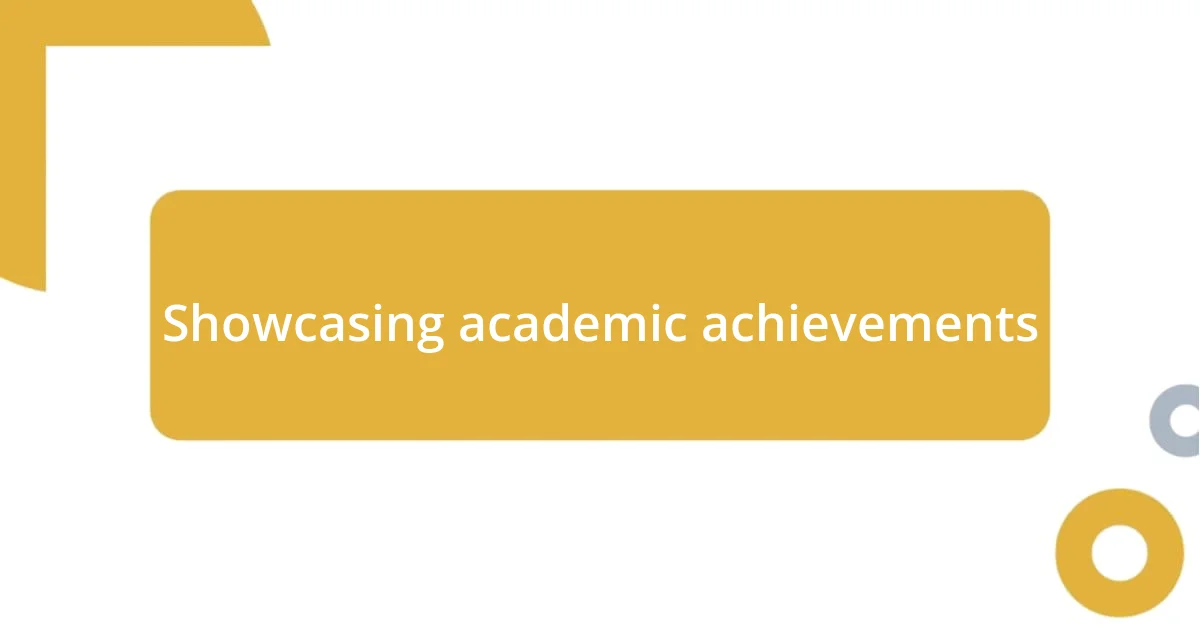
Showcasing academic achievements
Showcasing academic achievements on my CV was a transformative experience. Instead of merely listing my grades, I took a creative angle by highlighting specific projects I excelled in during my coursework. I remember crafting a research paper on renewable energy that not only earned me an ‘A’ but also sparked interest among my professors. They encouraged me to present my findings at an academic conference, which was a turning point that added a layer of credibility to my application. Have you thought about how your academic projects could showcase your passion and initiative?
While drafting my CV, I discovered the power of related coursework. I didn’t just list classes; I connected them to my career aspirations. For instance, in my Environmental Science class, I collaborated on a project that explored sustainable agricultural practices. Sharing the success of that project underscored my deep engagement in my field and my commitment to making a difference. It wasn’t just about the grades; it was about the knowledge and skills I acquired. What story are your academic experiences telling?
To truly elevate my academic achievements, I also emphasized relevant honors and awards I received. Rather than simply stating that I made the Dean’s List, I explained how consistent hard work and dedication in my studies led to opportunities for scholarships and grants. This not only highlighted my academic performance but also demonstrated that my efforts had real, tangible rewards. Have you considered how accolades can weave a narrative of perseverance in your CV? Sharing how these achievements influenced my educational journey made my application stand out in a sea of qualifications.
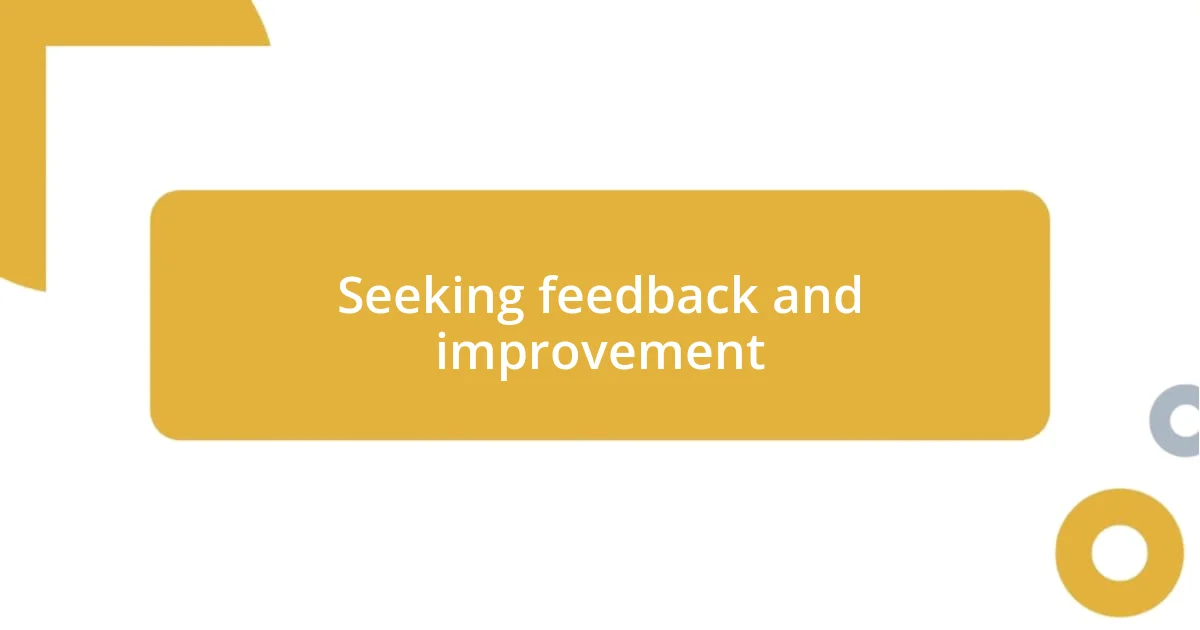
Seeking feedback and improvement
I found that seeking feedback on my CV was a game-changer in my scholarship application process. I remember sharing my draft with a mentor who had experience reviewing applications. Their insights not only pointed out areas needing clarity but also highlighted strengths I hadn’t recognized—like how my leadership roles in clubs could showcase teamwork and initiative. It was an eye-opener; have you ever considered how an outside perspective can illuminate your blind spots?
After receiving feedback, I took a step back to reflect on my achievements holistically. I revisited each section of my CV with fresh eyes, asking myself questions like, “Does this truly represent my journey?” This self-assessment led to rephrasing some accomplishments to emphasize my learning process and the skills I gained, rather than just the end results. I felt more authentic in articulating my experiences, which is crucial when your CV is your first impression.
Encouraged by the positive feedback, I made it a point to continuously seek input. Whether it was from friends or academic advisors, each critique brought new perspectives. I vividly recall a peer’s suggestion to incorporate a few personal anecdotes. This advice not only enriched my CV but also transformed it into a narrative that invited the reader into my experiences—making them more relatable and memorable. Isn’t it amazing how collaborative efforts can refine and elevate our personal stories?










